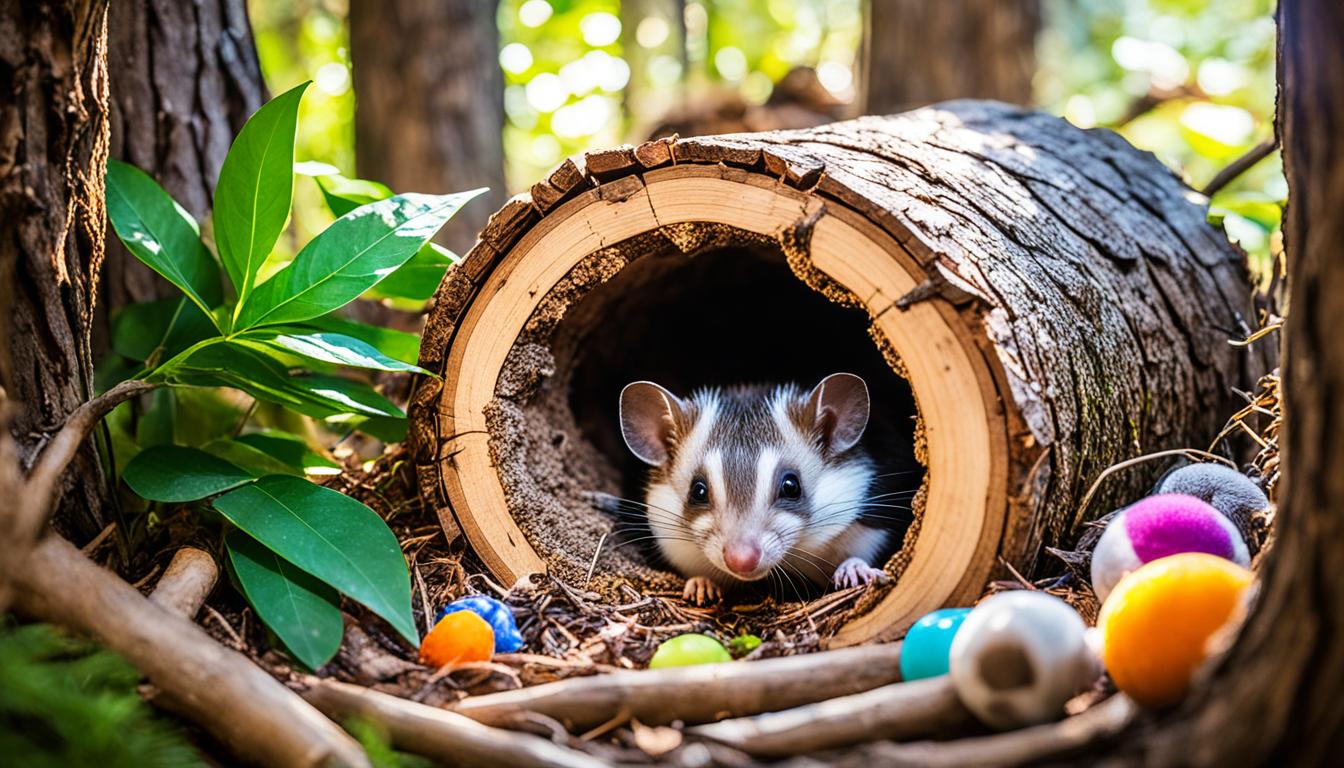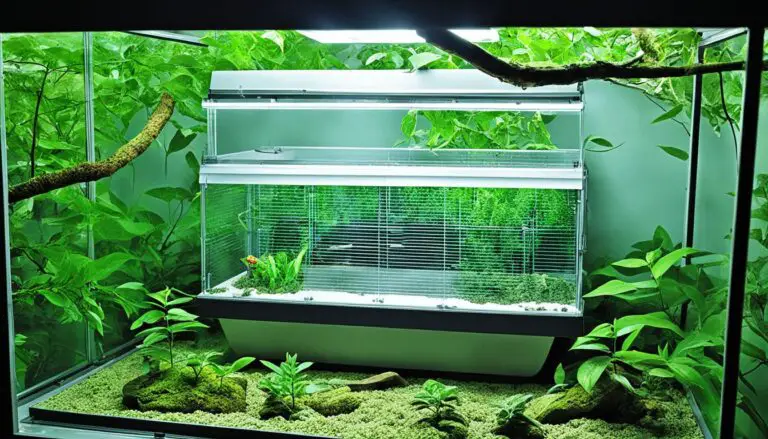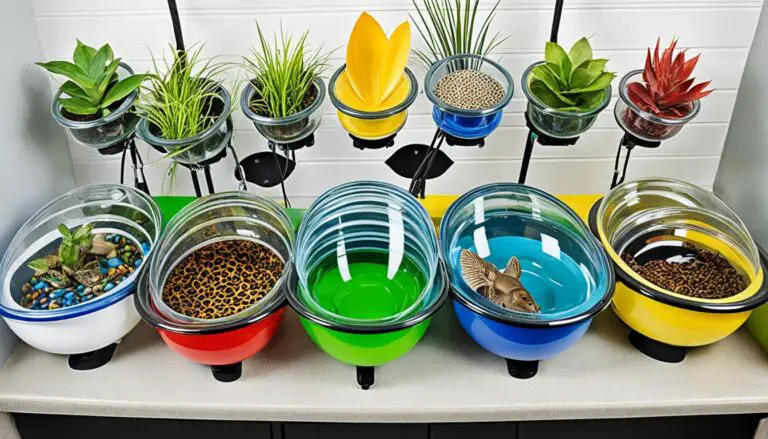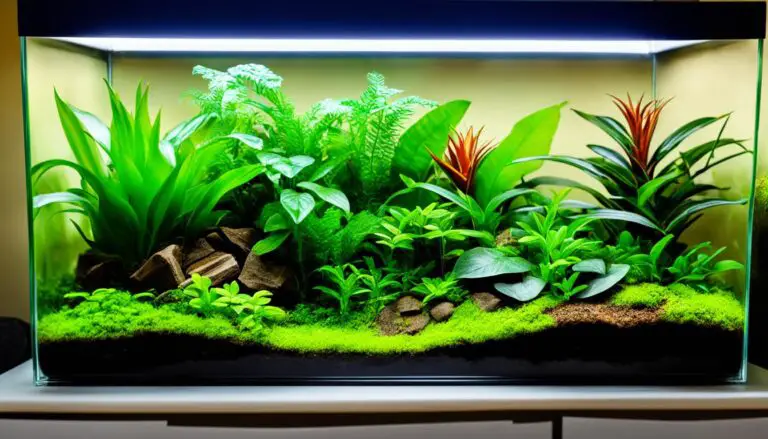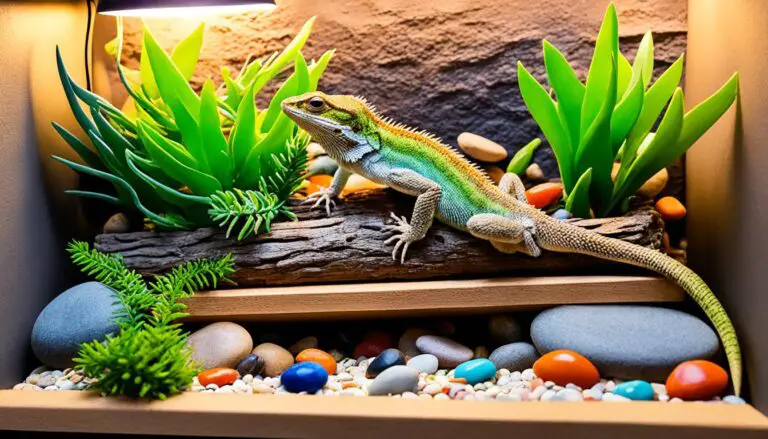Exotic Pet Housing for Small Mammals: Complete Guide
Learn how to provide the best housing for your exotic pet. We’ll guide you through small mammal cage ideas, the best enclosures for exotic pets, and tips for designing a habitat that meets their unique needs.
Key Takeaways:
- Exotic pets require specialized housing to ensure their comfort and well-being.
- Small mammal cages should be designed with the specific needs of the exotic pet species in mind.
- Choosing the right enclosure and creating an ideal environment is crucial for the health and happiness of your exotic pet.
- Proper nutrition, enrichment, and veterinary care are essential for their overall well-being.
- Being a responsible exotic pet owner involves educating yourself, finding a suitable veterinarian, providing a safe environment, and understanding the pet’s specific needs.
Understanding Exotic Pets and their Housing Requirements
Exotic pets encompass a diverse range of undomesticated species that require unique care and specialized housing. While traditional pets like cats and dogs are more familiar, exotic pets can include various small mammals, reptiles, amphibians, and birds. When it comes to small mammal species, some common examples are rodents (rats, mice, guinea pigs, gerbils, hamsters, degus, and chinchillas), rabbits, ferrets, and sugar gliders.
Providing appropriate housing and care for these small mammal exotic pets is essential for their health and well-being. Understanding their specific needs is the first step in ensuring their proper care. This includes knowledge of their natural behaviors, specific dietary requirements, and appropriate handling and restraint techniques.
Exotic pet handling and restraint is an important aspect of their care. Different species have different temperaments and sensitivities, and it’s crucial to handle them with care to minimize stress and potential injury. Learning proper handling techniques, such as supporting the body correctly and avoiding sudden movements, can help prevent accidents and promote a positive bond between you and your pet.
Why is understanding exotic pets important for their housing requirements?
Each species of exotic pet has unique housing requirements that must be met to ensure their health and well-being. Factors such as the size of the enclosure, temperature and humidity control, bedding materials, and the availability of specific resources like hiding places and climbing structures all contribute to creating a suitable habitat.
Additionally, understanding their natural behaviors and instincts is crucial for designing a housing environment that provides mental stimulation and enrichment. By replicating elements of their natural habitats, such as providing appropriate substrates, toys, and opportunities for social interaction, you can help to prevent boredom and promote their overall well-being.
Proper understanding of exotic pets and their housing requirements is the foundation for providing them with the care and environment they need to thrive.

| Exotic Pet Species | Housing Requirements |
|---|---|
| Rodents (rats, mice, guinea pigs, gerbils, hamsters, degus, and chinchillas) | Spacious cages with appropriate bedding and hiding places. |
| Rabbits | Large enclosures with areas for exercise, appropriate flooring, and constant access to hay and fresh water. |
| Ferrets | Cages with multiple levels, bedding, hiding spots, and opportunities for play and exploration. |
| Sugar Gliders | Tall cages with branches and other climbing structures, as well as nesting boxes for sleep. |
| Reptiles and Amphibians | Enclosures with appropriate lighting, temperature gradients, substrates, and hiding places. |
| Birds | Spacious cages with perches, toys, and opportunities for flight and mental stimulation. |
Understanding the housing requirements of each exotic pet species is essential for creating a safe and comfortable environment where they can thrive. By providing the right housing and care, you can ensure a happy and healthy life for your small mammal exotic pet.
Creating the Ideal Exotic Pet Environment
Providing the right environment is essential for the health and well-being of exotic pets. To ensure their comfort and happiness, here are some key factors to consider:
Choosing the Location for the Enclosure
When selecting a location for your exotic pet’s enclosure, it’s important to find a spot that is quiet, away from excessive noise and foot traffic. This helps create a stress-free environment for your pet.
Implementing Safety Precautions
Safety should be a top priority when creating an exotic pet habitat. Consider placing the enclosure away from potential hazards such as toxic plants, sharp objects, and electrical outlets. It’s also important to research any potential dangers specific to your pet’s species.
Regulating Temperature and Humidity
Exotic pets often have specific temperature and humidity requirements. Research the ideal climate range for your pet and invest in appropriate climate control devices to ensure their comfort. A thermostat and a hygrometer can help you monitor and adjust these conditions.
Selecting Appropriate Bedding
Choosing the right bedding is crucial for your pet’s health and hygiene. Consider their species-specific needs and preferences. For example, some exotic pets may require soft bedding material, while others may benefit from substrates that help with burrowing or moisture control.
Maintaining Proper Hygiene
Regular cleaning and maintenance of the enclosure are essential to prevent the build-up of waste and bacteria. Establish a cleaning routine to ensure a clean and hygienic environment for your pet. This includes removing soiled bedding, disinfecting surfaces, and providing fresh water regularly.
Ensuring Resource Access
Your pet should have easy access to essential resources such as food, water, hiding places, and enrichment items. Place food and water bowls in accessible areas and consider providing structures, branches, or tunnels for hiding and climbing. Enrichment toys and visual stimuli can also help keep your pet mentally stimulated and happy.

Remember, each exotic pet species has specific needs and preferences. It’s essential to research and understand the requirements of your pet to ensure their environment meets their unique needs.
Proper Nutrition for Exotic Pets
Exotic pets have unique dietary needs that mirror their natural diet in the wild. Providing a species-specific diet is crucial for their overall health and well-being. Commercial diets may be available, but it’s important to ensure that they are appropriate and not harmful to your exotic pet.
Feeding your exotic pet an improper diet can have detrimental effects on their health. Some potential consequences of inadequate nutrition include:
- Vitamin deficiencies
- Gastrointestinal problems
- Stunted growth
- Dental health problems
Consulting a veterinarian is essential in determining the precise dietary guidelines for your exotic pet. They can provide expert advice based on the specific needs of your pet’s species.
| Feeding Guidelines for Exotic Pets | Potential Health Consequences |
|---|---|
| 1. Offer a species-specific diet | – Vitamin deficiencies – Gastrointestinal problems |
| 2. Avoid inappropriate or harmful commercial diets | – Stunted growth – Dental health problems |
| 3. Provide a balanced mix of nutrients | |
| 4. Consider dietary supplements if necessary |
Remember that each exotic pet species has its own specific nutritional requirements. It’s important to research and consult with a veterinarian who specializes in exotic pet care to ensure that you are providing the best possible diet for your pet.

“Proper nutrition is the foundation of good health for your exotic pet. By providing a species-specific diet and consulting with a veterinarian, you can help promote their overall well-being and prevent potential health issues.”
Enrichment and Well-being for Exotic Pets
Captivity can lead to stress and boredom for exotic pets. It is crucial to prioritize their enrichment and well-being to ensure a healthy and fulfilling life. By providing stimulating and species-appropriate challenges, incorporating toys, visual stimuli, and structures into their environment, and encouraging positive social interactions and companionship, we can enhance their overall quality of life.
Enrichment plays a vital role in promoting the natural behaviors and instincts of exotic pets. It helps prevent boredom, depression, and other behavioral issues that may arise from being confined to an artificial habitat. Animal husbandry practices that prioritize enrichment are essential to promote physical and mental well-being.
Toys are an excellent way to engage exotic pets and keep them mentally stimulated. Whether it’s puzzle feeders, chew toys, or interactive playthings, providing a variety of toys can challenge their cognitive abilities and encourage active exploration. Toys that encourage foraging, hunting, and problem-solving mimic their natural behaviors and promote a sense of fulfillment.
Visual stimuli, such as mirrors, colorful objects, or even videos specifically designed for exotic pets, can provide additional sensory stimulation and mental engagement. These visual stimuli can mimic dynamic environments, providing a more enriching experience for these animals.
Structures within the captive environment can provide opportunities for climbing, hiding, and exploring. Utilizing branches, shelves, tunnels, and climbing structures can simulate the natural habitat of the exotic pets and encourage physical activity. Creating a diverse and multi-level environment can provide different challenges and diversify their experiences.
Ensuring positive social interactions is also crucial for the emotional well-being of exotic pets. For species that are naturally social, providing appropriate companionship can alleviate stress and loneliness. However, it is essential to introduce new companions gradually, considering their compatibility and conduct proper socialization to prevent conflicts.
Companionship can provide emotional stimulation and mitigate the negative effects of isolation. It is important to research the specific social needs and preferences of different exotic species and ensure that their housing allows for positive social interactions.
Benefits of Enrichment and Positive Well-being for Exotic Pets
| Benefits | Explanation |
|---|---|
| Physical Exercise | Enrichment activities and structures encourage movement and exercise, promoting overall physical health and preventing obesity. |
| Mental Stimulation | Enrichment provides mental challenges that simulate natural behaviors, helping to alleviate boredom and prevent the development of behavioral issues. |
| Emotional Well-being | Positive social interactions and companionship contribute to a sense of security, reducing stress and promoting emotional well-being. |
| Prevention of Stereotypies | Engaging activities and a stimulating environment can help prevent stereotypic behaviors, such as repetitive pacing or self-injury. |
| Improved Lifespan | Providing a rich and fulfilling environment can enhance the overall health and longevity of exotic pets. |
By prioritizing exotic pet enrichment and well-being through animal husbandry practices that incorporate stimulating challenges, toys, visual stimuli, structures, positive social interactions, and companionship, we can help ensure that these animals thrive in captivity.
Veterinary Care for Exotic Pets
Regular veterinary care is crucial for exotic pets to maintain their health. Finding a veterinarian experienced in treating exotic pets is important for comprehensive care. Regular check-ups, routine blood work, and parasite screenings are recommended.
“Regular veterinary care is crucial for exotic pets to maintain their health.”
Exotic pets have unique needs and require specialized care that not all veterinarians are trained in. It is essential to find a veterinarian who has experience and expertise in treating exotic pets.
During regular check-ups, the veterinarian will assess your exotic pet’s overall health, including checking vital signs, examining the skin, coat, eyes, ears, teeth, and nails. They may also perform routine blood work to evaluate organ function and screen for any underlying health conditions.
Parasite screenings are essential as parasites can be common in exotic pets and can cause significant health issues if left untreated. The veterinarian may collect a stool sample to check for intestinal parasites or perform skin scrapings to check for external parasites.
Regular veterinary visits are an opportunity for pet owners to discuss any concerns or observations they have about their exotic pet’s health or behavior. It’s important to monitor your pet’s health closely and seek veterinary attention if you notice any changes in appetite, weight, activity level, or other concerning behaviors.
Recognizing Signs of Illness or Injury
As a responsible exotic pet owner, it’s crucial to be able to recognize signs of illness or injury. Exotic pets may hide signs of illness or injury, so careful observation and monitoring are essential.
Some common signs of illness or injury in exotic pets include:
- Decreased appetite or lack of interest in food
- Weight loss or sudden weight gain
- Lethargy or decreased activity level
- Changes in drinking habits
- Difficulty breathing
- Changes in skin or coat condition
- Abnormal bowel movements or urine
If you notice any of these signs or any other abnormal behavior, it’s important to seek veterinary care promptly. Early detection and treatment can often lead to better outcomes for your exotic pet’s health.

| Veterinary Care Checklist for Exotic Pets |
|---|
| Regular check-ups and physical examinations |
| Routine blood work and parasite screenings |
| Monitoring for any signs of illness or injury |
| Consulting a veterinarian experienced in treating exotic pets |
Remember, preventative care plays a significant role in keeping your exotic pet healthy. By establishing a regular veterinary care routine and monitoring your pet’s health closely, you can ensure your exotic pet receives the care and attention they need to thrive.
Important Considerations for Exotic Pet Owners
Owning an exotic pet is an exciting and unique experience that requires careful consideration and preparation. Before bringing an exotic pet into your home, it’s important to address several important factors to ensure a positive and fulfilling pet ownership experience.
Discussing Pet Ownership
Before making a decision, have open and honest discussions with all members of your household about the responsibilities and commitments that come with owning an exotic pet. Discuss the time, effort, and financial resources required to provide proper care and accommodate the unique needs of the species you’re considering.
Finding a Veterinarian
Locating a knowledgeable veterinarian experienced in exotic pet care is crucial for the well-being of your pet. Research and seek recommendations from other exotic pet owners, animal shelters, or local exotic pet organizations to find a veterinarian who can provide the necessary medical care and guidance specific to your pet’s species.
Providing a Safe Environment
Creating a safe environment is essential to prevent accidents, injuries, and escapes. Ensure that your home is pet-friendly by pet-proofing any potential hazards, such as toxic plants, open windows or doors, and electrical cords. Consider securing enclosures or providing escape-proof habitats suitable for your pet’s needs.
Affording Necessary Care
Exotic pets may require specialized diets, enclosures, and veterinary care, which can be costly. Before bringing an exotic pet into your home, carefully evaluate your financial situation and determine if you can afford the necessary expenses. Consider potential long-term costs, including regular veterinary visits, food, supplies, and emergency care.
Providing Ample Space
Exotic pets often require ample space to thrive. Research the specific needs and space requirements of your chosen species and ensure you can provide an environment that allows for adequate exercise, exploration, and mental stimulation. Remember that a cramped environment can lead to behavioral issues and stress.
Understanding Lifespan
Each exotic pet species has a unique lifespan, ranging from a few years to several decades. Understanding the potential lifespan of your pet is crucial for long-term planning and commitment. Consider the emotional attachment that may develop over time and ensure you can provide consistent care for the duration of your pet’s life.
Pet Poison Helpline and Emergency Care
Accidents and emergencies can happen with exotic pets. It’s important to have contact information for a pet poison helpline and know how to assess the situation and seek veterinary advice. In case of a life-threatening emergency, it’s crucial to quickly locate and access emergency veterinary hospitals for immediate care.
Assessing the Situation
When faced with a potential emergency involving your exotic pet, it’s important to stay calm and assess the situation. The first step is to ensure your own safety, as some emergencies may involve aggressive or injured animals. Take a moment to evaluate your pet’s condition and look for any immediate dangers or signs of distress.
If your pet has ingested a potentially toxic substance, it’s important to act quickly. Look for any evidence of what your pet may have ingested and gather any packaging or labels for reference. This information will be valuable when seeking veterinary advice or contacting a pet poison helpline.
If your pet is experiencing symptoms such as difficulty breathing, excessive bleeding, seizures, or loss of consciousness, it’s considered a life-threatening emergency. Immediate veterinary care is vital in these situations.
Seeking Veterinary Advice
When facing an emergency with your exotic pet, it’s crucial to seek veterinary advice as quickly as possible. Veterinarians experienced in treating exotic pets will have the knowledge and expertise to provide appropriate guidance and recommendations.
Contact your regular veterinarian or search for a local veterinary clinic that specializes in exotic pet care. Explain the situation and follow their instructions for immediate care or potential transportation to their facility. If your regular veterinarian is not available, they may provide alternate contact information for emergency veterinary services.
Accessing Emergency Veterinary Hospitals
In the event of a life-threatening emergency with your exotic pet, it’s important to know the location and contact information of emergency veterinary hospitals in your area. These facilities are equipped to handle urgent situations outside normal business hours.
Research and note down the closest emergency veterinary hospitals to your location. This information should be easily accessible in case of an emergency. Keep important contact numbers in a visible location, such as on your refrigerator or saved in your phone.
Be prepared to provide details about your pet’s condition when contacting emergency veterinary hospitals. This will help them assess the situation and provide appropriate advice or instructions on seeking immediate care.
Remember, in a life-threatening emergency, every second counts. Stay calm, assess the situation, seek veterinary advice, and access emergency veterinary hospitals promptly to ensure the best possible care for your exotic pet.
| Emergency Care Resources | Contact Details |
|---|---|
| Pet Poison Helpline | 1-800-213-6680 |
| Local Emergency Veterinary Hospital #1 | 123-456-7890 |
| Local Emergency Veterinary Hospital #2 | 987-654-3210 |
Conclusion
Providing appropriate housing for exotic pets, especially small mammals, is paramount for their overall health and well-being. Understanding their unique needs, creating the ideal environment, providing proper nutrition, enrichment, veterinary care, and assuming the role of a responsible pet owner are all vital aspects of ensuring a happy and healthy life for your exotic pet.
By educating yourself about your pet’s specific requirements and consulting with professionals in the field, you can make informed decisions and provide the best care possible. Remember to do thorough research, as well as seek advice from experienced exotic pet owners or reputable organizations dedicated to the well-being of these animals.
In conclusion, investing time, effort, and resources into exotic pet housing will not only benefit the animal but also deepen the bond between you and your furry friend. Before embarking on the journey of exotic pet ownership, make sure you are fully committed to providing a safe, stimulating, and comfortable environment that encourages natural behavior and supports their physical and psychological needs.
FAQ
What are some key considerations when it comes to housing exotic pets?
What dietary considerations should I keep in mind for my exotic pet?
How can I provide enrichment and promote well-being for my exotic pet?
How often should I take my exotic pet to the veterinarian?
What are some important considerations for exotic pet owners?
What should I do in case of an emergency with my exotic pet?
Can you summarize the essential points of this guide?
Source Links
- https://www.happyhealthypets.com/pet-resources/comprehensive-guide-to-caring-for-exotic-pets
- https://assets.ctfassets.net/440y9b545yd9/1OllFH7b8kpvhSxf1eXvJt/5ebe9b432cca7c89812cbc617cadb190/Nationwide_-_New_Small_Mammal_Owner_Guide_-_2022.pdf
- https://oxbowanimalhealth.com/blog/beginners-guide-small-exotic-pets/
Peter Stones is the founder of Exotic Pets Place, the leading online resource for exotic pet care information.
With over 10 years of hands-on exotic pet ownership experience, he is deeply passionate about sharing his expertise to help others properly care for their unusual pets.
When he's not writing extensively researched articles or connecting with fellow exotic pet enthusiasts worldwide, you can find Peter at home tending to his own beloved menagerie of exotic animals.

